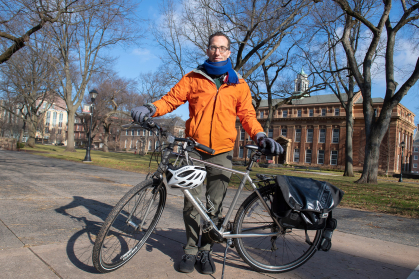Rutgers Tackles Climate Change Solutions at White House Forum

Rutgers is joining several colleges and universities this week at a White House forum on climate change exploring how innovative actions developed on campuses can benefit surrounding communities and beyond.
The White House Office of Science and Technology Policy will bring together climate, sustainability and resilience leaders and educators from colleges and universities across the country with federal agency leaders to share climate change solutions.
“This national gathering will shine a light on the critical role universities can and are playing to address the climate crisis,” said Francine Newsome Pfeiffer, vice president for federal relations at Rutgers. “From sustainability investments on our campuses, to our innovative research, to educating a climate solutions-oriented workforce, universities are an important part of our nation’s efforts in climate adaptation and mitigation.”
The two-day forum, March 8-9, supported by the National Science Foundation, will foster a better understanding of the work underway at colleges and universities and begin to examine how universities can better collaborate with other institutions and the government, Pfeiffer said. Federal government officials will hear directly from researchers and campus climate leaders on the opportunities and challenges they face.
Rutgers, which adopted a Climate Action Plan in 2021, is committed to mobilizing the university’s academic, operational and economic capacities to advance just, equitable climate solutions and help achieve national net-zero greenhouse gas emissions no later than 2050, said Robert Kopp, a climate scientist and professor in the Department of Earth and Planetary Sciences who serves as co-director of the Rutgers University Office of Climate Action.
“We can only do so much alone, which is why one of the recommendations of the plan is that we work in partnership across the higher-education sector to help the nation achieve our climate goals,” Kopp added. “I hope that by bringing higher education representatives – from two-year colleges to leading global research universities – together with representatives of our national leadership, we will accelerate this work.”
Kopp will join higher education climate and sustainability colleagues on a panel to discuss ways to quicken the pace of adopting climate solutions developed at universities.
The climate scientist, who also directs the Megalopolitan Coastal Transformation Hub (MACH), a National Science Foundation-funded consortium that advances coastal climate adaptation, will share Rutgers’ action plan commitments, the university’s pioneering Coastal Climate Risk and Resilience graduate training program and the work Rutgers organizations, like the New Jersey Climate Change Resource Center and research initiatives like the MACH, are doing to support the state and regional communities.
“My hope is that the summit will allow us to share our successes, learn from the experiences of our peers and encourage federal support to scale this work,” Kopp said.

Pfeiffer noted that the federal government and Congress have approved historic investments in clean energy, transportation and infrastructure over the past two years, which she said could lead to greater collaboration across federal agencies and universities, as well as more opportunities for direct federal funding to support the work underway at Rutgers and on college campuses across the country.
“I believe our March meeting at the White House will be a critical step in galvanizing these efforts and spur additional climate-related activities on college campuses,” Pfeiffer said.
The virtual event is open to all to attend and will be livestreamed. Find registration information here.


